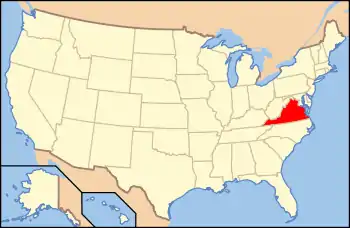Dumpling Island Archeological Site
The Dumpling Island Archeological Site is a Late Woodland period archaeological site on Dumpling Island in Suffolk, Virginia, United States. The site encompasses the remains of a Native American village associated with the Nansemond people. The island was identified by explorer John Smith as a "Chaukie Hand" because of the large shell middens he saw. The Nansemond village was attacked and burned by English colonists from the Jamestown Colony in 1609, but quickly recovered. Test excavations in 1986 and 1995 found the site to be in excellent condition.[2]
Dumpling Island Archeological Site | |
 Overview from southwest | |
| Nearest city | Suffolk, Virginia |
|---|---|
| Area | 14 acres (5.7 ha) |
| Built | 1609 |
| NRHP reference No. | 98000046[1] |
| Added to NRHP | February 10, 1998 |
The site was listed on the National Register of Historic Places in 1998.[1]
References
- "National Register Information System". National Register of Historic Places. National Park Service. July 9, 2010.
- Cordell, Linda (ed) (2009). Archaeology in America: An Encyclopedia. Westport, CT: Greenwood Press. p. 103. ISBN 9780313021893.CS1 maint: extra text: authors list (link)
This article is issued from Wikipedia. The text is licensed under Creative Commons - Attribution - Sharealike. Additional terms may apply for the media files.

